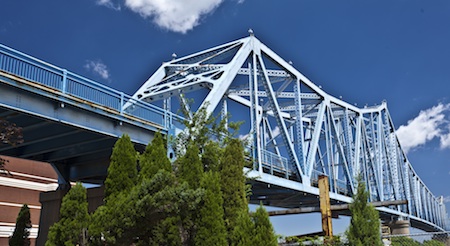Remember in the 2004 presidential campaign when George W. Bush and John Kerry briefly sparred over the price of gas? Democrats predictably blamed “Big Oil” and promised Congressional investigations. Republicans blamed Democrats and environmentalists for blocking efforts to build more refineries and drill for more oil, especially in Alaska. The tussle failed to attract more than the attention of a couple of political reporters. Why? Gas prices nationally were $1.80 a gallon, and only in California did they rise above $2 a gallon.
Well get ready for $5 a gallon fuel next summer when the price of gasoline becomes the issue of the presidential campaign. At that price, gasoline will top Iraq as the top concern of most voting Americans. And get ready for the Republican message machine to do what it does best: focus on a single issue, identify villains, command the message agenda, propose actions that working people find plausible, dial into its constituency, and pull the G.O.P. into position to win an election it has no business even being competitive in.
[youtube]tbzzeuYJteY[/youtube]
Here are the suppositions and observations upon which this scenario is built. First, gasoline prices have climbed nearly 60 percent over the last five months — in January the national average was $2.33 a gallon – and this month reached $3.65 a gallon in northern Michigan, just 35 cents less a gallon than the $4 level I predicted in April. The knife edge that separates demand and supply is so sharp now that any number of supply disruptions in the United States or overseas — storms, plant outages, strikes, pipeline failures, shipwrecks — can cause prices to rise 25 cents in a day, as we saw here in late April. It’s easy to forecast $5 a gallon next summer. The underlying market forces are pushing prices inexorably higher.
Second, fuel prices affect every American, regardless of whether they live in cities and barely use their vehicles, or live in the suburbs and rural regions and drive 20,000 miles a year or more. The rising cost of fuel is one of the most closely watched indicators of economic and social well-being because until the nation figures out that cars, highways, strip malls and parking lots are no longer the best measure of what makes a place great, the United States will continue to experience a collective stomach ache in most households, and in some real hardship. This month my family’s fuel bill rose from the $325 a month that we normally spend on gasoline to over $500 a month. I earn a decent living and we are fortunate to be able to fold the extra cost into our budget. But for hundreds of families in this rural region who drive as much or more than we do, an extra $175 a month for fuel is the difference between survival and foreclosure.
The Traverse City Record-Eagle reported on Sunday that home foreclosures have quadrupled in northwest Michigan since 2000, and with gas prices climbing the numbers will accelerate. School administrators in our rural district anticipate enrollment will drop in September by 81 kids, a six percent decline from enrollment this year. In other words, 35 families with children are expected to leave Benzie Countyover the summer.
Third, the suburban and rural voters affected most by $5 a gallon gas live in predominantly Republican red counties. Though they may be disillusioned with George Bush and his administration of inept managers (I’m being delibarately kind out of respect for my GOP readers) they are still inclined to vote Republican if the party convenes around a candidate and a message that makes sense. For the G.O.P message masters, $5 a gallon gas is an easy one. They know high gas prices aren’t just an irritant for their working family constituency in the suburbs and rural areas. It’s an emergency. They can lay the blame at the feet of liberals who blocked the oil industry from developing new reserves and used regulatory barriers to impede construction of new refineries. They can convince their voters that the solution lies in electing Republicans who will open offshore fields and the Alaskan National Wildlife Refuge to exploration, limit the reach of onerous regulations that further limit supplies, and offer even more subsidies and incentives to the oil industry to build new refineries.
Whether the Republican solutions have any merit — and none of them do — is not the point in a presidential campaign. As we’ve learned in this century, facts and truth are not necessarily the most important building blocks to credibility. More important for the anticipated Republican message is that the Democrats, once again, have no message on gasoline prices. Check out House Speaker Nancy Pelosi’s grand standing on the issue in Washington earlier this month (see video). The Center For American Progress, a prominent Democratic activist think tank in Washington, is a good example of the Democrats’ absolute failure to anticipate and respond to the issue. The Center’s recipe for dealing with high gasoline prices involves (1) blaming the oil companies, (2) comiserating with consumers, and (3) noting that lower prices would be a benefit to millions of Americans. It’s pathetic.
If Democrats fail to develop a clearer and more relevant response to $5 a gallon gas — some mix of unexpected short-term relief like a gas tax moratorium with a realistic menu of emergency and longer term fuel economy rules, vastly increased investments in alternatives to driving, and incentives for designing more compact communities — they are likely to lose the White House again.


What amazes me is seeing Dems talk about adding taxes to gasoline. Like I needed more incentive than a three-fold rise in prices to drive less.
To some extent, this is the clueless behavior of people who have more than enough.
The “progressive” side of the spectrum should put some energy into producing a car for under $5000 that gets 50 mpg. They could probably just build a car from the past and keep the price low because all the patents have died of old age.
The fact that “progressives” literally can’t conceive of such an idea says worlds about their world.
Ah, so many points to ponder and reply to.
1) excellent post on the respective parties abilities to frame issues.
2) I’m not sure about $5 gas, but then I was wrong about the late spring surge
Note: prices currently coming down :
http://www.michigangasprices.com/retail_price_chart.aspx
3) another “counter argument” will be the government mandated (not that the mandates are wrong) standards for various formulations, seasonal and regional. Gasoline is not a fungible as it once was.
Further, my understanding is that refineries are just finishing up major overhauls to reduce sulfur content (both gasoline and diesel) … capacity may increase.
4) there are two sides of the “no new refineries” … true that no new ones have been built (the Republican argument) but there have been large increases in capacity within existing refineries (Democrats may not pick up on this – too hard to “sound bite”)
5) I’d caution on your implied causality of high gas prices – to foreclosures – to school enrollments.
a) Foreclosures likely due to housing market stress and implosion of sub-prime lending/mortgages.
Of note – Congress has pushed for the sub-prime lending and will be hard pressed damn the lenders, they (Congress) are caught on this one. See Fanny Mae etc.
b) enrollment due to loss of manufacturing jobs and workers leaving, even while retirees move in. Retirees don’t have school age kids.
6) pricing in general: I attended talk by Professor Emeritus Dr. Roland Drayson, Leland, on Global Warming (sponsered by Leelanau Conservancy) where, in response to questions about “alternative energy” he pointed out that current “alternative” sources are too expensive, and maybe fossil fuels are “too cheap” in the marketplace.
Higher prices will change behavior …over time
This is the crux of the problem, we can’t want to reduce greenhouse gases and demand cheaper fuels at the same time.
Your answer for more compact living is on the right track
I’ll be the exception and live in the boonies, but don’t really drive all that much, average monthly cost was about $250 last year (including snowblower, chainsaws etc.)
Lastly, answer for the prior comment on $5K car at 50MPG … that’s a 1990 hybrid – doubt that you could find one. I think patents run for 17yrs, therefore picked 1990.
Doubt that you will find any new car at $5K with compliance with government mandates, such as crash protection etc. Not to mention the built in costs of UAW health benefits … not a knock on UAW, just a fact of life for “Detroit”
Some Chinese import, maybe, if they can meet safety standards, but that means even fewer jobs here.
Keep up the good work(s)
Ciao
Chip
Chip,
Good to see you last night. My observation and reporting indicate that fuel prices will have a more profound effect on foreclosures than we currently anticipate in the US. Reason: in households already stretched by the costs you describe, the extra several hundred dollars a month spent on fuel to get to work will push people to crisis. In the five county-region of northwest Micihigan, for example, the number of mortgage foreclosures jumped to more than 50 a month this year, up from just under 11 per month in 2000. The sharp increase coincides with a nearly 60 percent increase this year in the cost of gasoline in northwest Michigan. Best, Keith
Keith
Agree – good program Fri
Sister is friends with Helen, sorry Bill couldn’t make it
As for topic of foreclosures, will have to put pencil to paper (actually do some web-work and spreadsheet)
Weighing factors
Gas vs interest rate structure and how many current foreclosures are “sub prime” ( all the interest only, adjustable rate, etc. ones ) vs conventional mortgages
Down the road, watch for food costs, with ethanol driving corn prices
Personal opinion is that ethanol from corn is bad idea, tied to Iowa cacuses
With one of my food companys, we’re already seeing the effect, and it’s affected Michigan farmers crop decisions – hurting beans (farmers planting corn vs beans)
Ciao
Chip
Gas prices these days are just getting higher, i think the government should focus more on alternative energy.*`’
gas prices would steadily go up and the supply dwindle and the saudis like to increase their profit margin`.`